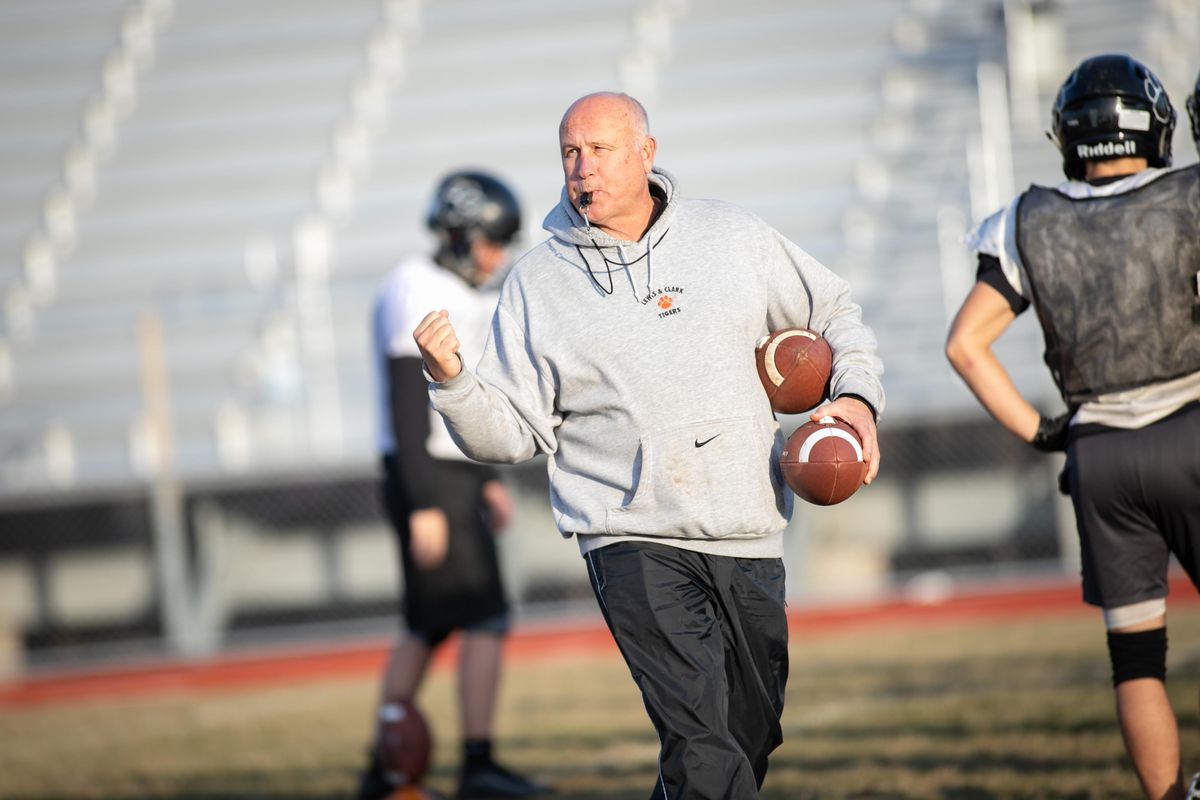Hanging up the whistle: Longtime football coach Dave Hughes moves on to new challenge as athletic director

It has been awhile since Dave Hughes wasn’t involved, as a player or a coach, in a training camp to open a football season. So long, in fact, that the last year the Lewis and Clark coach didn’t participate in “two-a-days,” they were still called “two-a-days,” Jimmy Carter was president and “Saturday Night Fever” was in the theaters.
After more than four decades in the game, Hughes is walking away the sport that has been a fixture in his life since “The Fonz” was the coolest guy in the U.S.
He announced to his team Wednesday that Thursday’s season finale against Southridge will be his last at the helm for the Tigers.
“Back in June, I had the opportunity to become the athletic director,” Hughes said. “It’s kind of an opportunity I’ve always wanted, and it was the right time for me as far as transitioning from being a classroom teacher to an athletic director, and then right time for me to say that this will be the last year of football that I’ll be coaching.
“So you know, it was a total outside force that led to my decision to be done with football this year.”
Hughes grew up in South Dakota and after high school went to Black Hills State, where he played linebacker and majored in history.
Since graduating from college, Hughes has been coaching in Spokane, first at Rogers – where he was one of the first coaches in the area to implement the zone blocking scheme – and then LC. Hughes was the offensive coordinator for the Tigers’ 2007 state championship team before becoming the head coach in 2009.
“I was getting toward the end of my career regardless of if the athletic director job came up,” he said. “Thirty-two years was long enough in the football position. I totally enjoyed the last 11 years as a head coach at Lewis and Clark and I enjoyed being an assistant at both Lewis and Clark and Rogers. I think it’s just a good time for me to go.”
Over time, and particularly over the course of four-plus decades, change is inevitable – but football has evolved dramatically, even more so in recent years.
Setting up the pass with the run is becoming increasingly outdated and being replaced by spreading the field with three- and four-receiver sets and stretching defenses vertically, horizontally and diagonally with the passing game to set up the run.
“The X’s and O’s have been interesting over 32 years,” Hughes said. “I played high school football and played college football and basically, back then in the 1980s, you amassed forces and you put a fullback in the game and you tried to go for 3 yards and then do it again. And any complex pass meant two outside receivers might be involved in the pass game.
“I had a mentor. Dave Carson, who was the head coach at Gonzaga Prep. He basically started teaching me the zone offense that he kind of picked up in California. And that’s more of a scheme that the pros would be running.
“(Carson) and Jeff Reyburn were both college coaches out of California and they came into the (Greater Spokane League) and kind of brought that and that changed a few things.”
But the changes to the game go beyond scheme. As player safety has become a bigger priority, especially when it comes to concussions and head injuries, the physical play and machismo that were once lauded and demanded have started to dissipate.
“The other big change I’ve seen over the years is we’ve had an evolution in both how the players have changed a little bit, and then how society sees football, basically,” Hughes said.
“Everybody knows that concussions are a big deal. It has been a part of our game. It’s part of girls soccer, it’s part of hockey, it’s part of any time that you’re doing contact against another human, there’s a chance to get concussions.
“At the ground level, concussions are reported by the athlete, and if they say they’re dizzy and their head hurts, it is taken to the concussion level. In the 1980s and ’90s, when a guy got hit, as a coach we’d just take them out for a few plays and let them gather themselves.
“It’s something that we’re evolving in, in this sport. And I think we don’t have all the answers yet. So that’s really made coaching the sport more difficult.”
Hughes is walking away from something that has been a part of his life since his childhood. Regardless of how the game has changed, leaving something you love is never easy, but he’s ready for a new chapter.
“I think one good thing is that I’m going to athletic director,” he said. “I’m still gonna be around sports, which is what I love.”
Luke Byrnes, a correspondent for The Spokesman-Review, is an assistant coach under Hughes at Lewis and Clark.